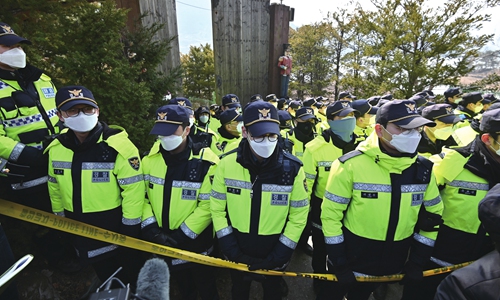HOME >> CHINA
Urgent to prevent virus import from SK sects: expert
By Wan Lin Source:Global Times Published: 2020/3/3 0:33:40
Urgent to prevent virus import from SK sects

Police officers stand guard in front of a facility of the Shincheonji Church of Jesus, as journalists gather for a press conference by church founder Lee Man-hee in Gapyeong, South Korea, on Monday. The leader of the sect apologized for the spread of the coronavirus in the country, where around half the 4,000-plus cases are connected to his organization. South Korea reported 586 new cases, taking the total to 3,736 as of Monday (See story on Pages 3 and 15). Photo: AFP
For South Korea with a high degree of religious fanaticism, preventing the spread of the virus in the country will present a big challenge, as it will be hard to convince religious believers to follow and listen to scientific advice and instructions from the government, Chinese experts said, noting that China should be careful to prevent re-import of the virus from South Korea, since it has been targeted by many South Korean sects for missionary activities.
The comments were made after the leader of a South Korean sect, Shincheonji Church, which is linked to more than half the country's 4,000-plus coronavirus cases apologized Monday for the spread of the disease.
"I would like to offer my sincere apology to the people on behalf of the members," said Shincheonji head Lee Man-hee, 89, his voice breaking. He twice got on his knees to bow before reporters in Gapyeong, his head to the floor, the Korea Times reported on Monday.
"Although it was not intentional, many people have been infected," he said.
This was Lee's first public response to the controversy of the church at the epicenter of South Korea's growing coronavirus outbreak.
Shincheonji Church, a religious organization which mostly practices in South Korea, is the center of the epidemic in South Korea.
South Korea confirmed 599 more cases of COVID-19 on Monday, raising the total number of infections to 4,335, and the death toll advanced to 26, the Xinhua News Agency reported. As of Monday midnight, 2,418 confirmed cases are connected with the Shincheonji Church, South Korean media KBS reported.
As a country where a third of the population are religious, South Korea's religiosity might bring the country extra risks amid the epidemic, Da Zhigang, director and research fellow of the Institute of Northeast Asian Studies at Heilongjiang Provincial Academy of Social Sciences, told the Global Times on Monday.
"Some religious sects believe that prayers alone can prevent or cure people from the disease, which might hinder their followers from having a scientific understanding of the epidemic and further cause the spread of the virus," said Da.
For tenacious churchgoers who have more faith in their worship or in their religious leaders than the government's regulations, their discontent may increase and further lead to protests if the government restricts their gathering, he noted.
The South Korean government confirmed for the first time that some Shincheonji followers were at the epicenter of the COVID-19 outbreak in Wuhan, Central China's Hubei Province in January, but their exact number is still unclear, said a South Korean government official at a press conference on Sunday, China Central Television reported on Sunday.
"The number of Shincheonji church members visiting Wuhan seems small, but it has yet been determined," the official from the central department of epidemic prevention in South Korea said Sunday, adding that the government will conduct a more detailed investigation to further understand the process of the large-scale infection currently taking place in the country.
According to the Ministry of Justice in South Korea, from July 1, 2019 to Thursday, 3,600 Shincheonji Church members have returned to South Korea from China, including 42 from Wuhan, the Yonhap News Agency reported.
Da said China is targeted by many South Korean religious groups for missionary activities, especially in Northeast China which borders the Korean Peninsula. In this crucial period of fighting COVID-19, the Chinese government needs to pay attention so that cases of the virus are not re-imported.
Normal religious activities of the country have been affected as well, while some churches in the country have turned to online worship to prevent unnecessary gatherings.
A Seoul-based Christian, Paul Shim, told the Global Times on Monday that the church he goes to has launched an online system for Sunday services to avoid crowds gathering at church because of the bad influence caused by the Shincheonji Church.
"I was not that worried a few days ago until I learned that a member of that sect who sneaked into a Christian church in Daegu was confirmed to have the coronavirus, and [authorities] put many church members under the medical observation," said Shim.
South Korea's Catholic Church announced the suspension of public masses across the country on February 26 to combat the spread of the novel coronavirus, the first such decision in the church's 236-year history, the Yonhap News Agency reported.
According to the latest national census in 2015 by the National Statistical Office of South Korea, about 44 percent of the population, about 22 millions, has affiliation of religions, and 27.6 percent, about 13-14 millions, are Protestants and Catholics.
Newspaper headline: Urgent to prevent virus import from SK sects